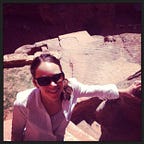If you can leave, leave.
Young, middle class Syrians make their way to Dubai
Adnan, Sana, and Jude have the soft faces and round lips of 20-somethings. I meet them at dinner as peers—as the youth they once were and whose bodies they still inhabit. Sana’s hair is perfectly teased for volume, then sleeked half back behind her ears where it draws out café eyes. Jude must have grown tall before his stomach could fill in. Adnan, the oldest, is dated only by his slightly wider waistline.
Three years ago, we would all have been young workers in this city. But they are here because at some point not long ago, middle class families like theirs started to think: if we can leave Syria, maybe we should. So first the husband, then his new wife, then his brother all got out. Cousins are traveling out of Syria now. Maybe more family from Idlib province will follow.
Adnan heads the conversation because he came first—he was pushed, with 184 others, into a Damascus cell of some 25 square meters. No windows, no ventilation, only the ominous knowledge that it was the intelligence agencies that had put him there. I could die here, he thought; many others had and would. Adnan had come to the Syrian capital to study, and after graduating, jobs had opened to him, including a standing job offer with a bank in Dubai. As soon as he was let out of the jail cell three days later, what other choice was there?, ask his crinkled forehead and forced smile.
Sana followed him in time, and now they pay too much for an apartment that is too big. Authorities demanded Adnan hold accommodation costing at least 30,000Dh a year in order to sponsor dependents. Sana should be proud to tell me she is now studying at the Sorbonne’s Abu Dhabi campus; for now, though, tuition is the cost of forcing the mind away from Syria. Jude arrived last, also to study, and I wonder if, behind the trendy yellow t-shirt is a boy who is lanky or just thin.
Dinner is over and lute music plays to laughing company full from the mezzeh of a Levantine chef. “It’s always easy to come to a place that’s calm after somewhere difficult,” Sana says. “But —” , she pauses.
She is beautiful, dressed in white and carefree polka dots. But now she says nothing, and the 20-somethings across from me are instead the age they have to be.
